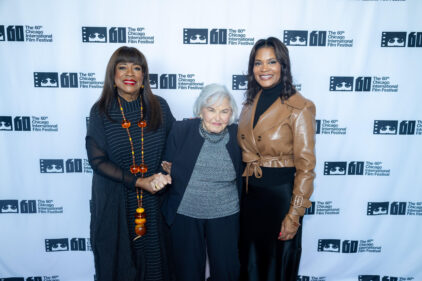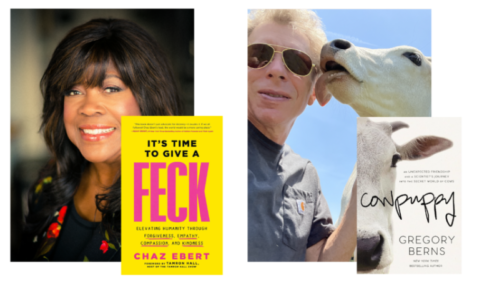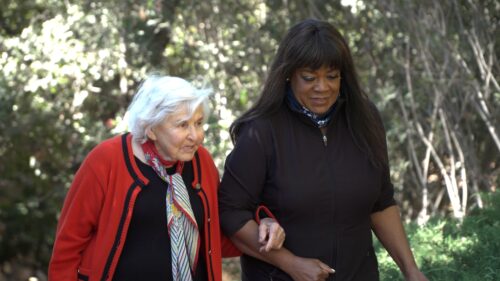RogerEbert.com Co-Founder and Publisher Chaz Ebert recently spoke to journalist Randi Mazzella about her bestselling book It's Time to Give a FECK:Elevating Humanity through Forgiveness, Empathy, Compassion and Kindness, and we are reprinting what was chosen by the editors of Next Avenue as the Article of the Day, for August 5th. Please go here for more information.
Randi Mazzella, NEXT AVENUE
It's hard to imagine another time when people seemed more at odds with one another. Between the aftermath of the pandemic, the current political climate in the United States and global issues, it feels like there is nothing but bad news and frustrated people worrying that things aren't getting better.
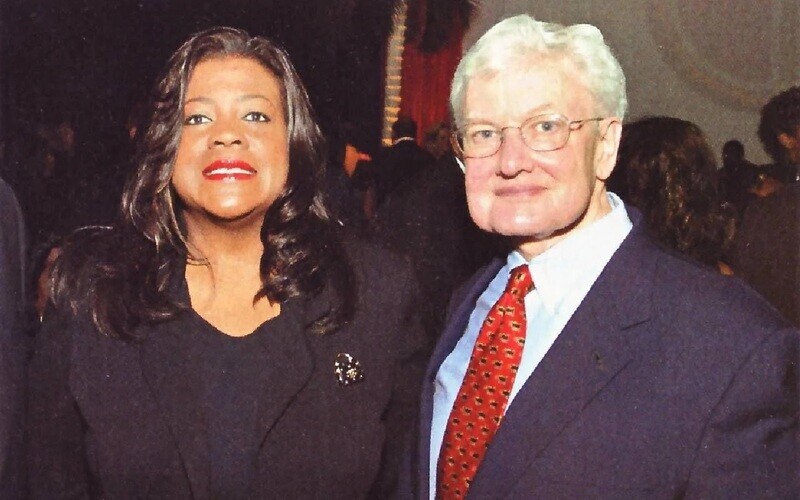
But author and activist, Chaz Ebert, still has hope. "When I started working on my book, I wasn't sure why I was writing it," explains Ebert. "But my family, especially my daughter, encouraged me to keep going. She said, 'You need to write this.' She was correct; this message is needed now more than ever."
Ebert's book, "It's Time to Give a FECK: Elevating Humanity through Forgiveness, Empathy, Compassion, and Kindness," is about four fundamental values that Ebert believes can help us all to help ourselves and our community.
Understanding Forgiveness
To understand forgiveness, Ebert, 71, writes about a conversation with South African Archbishop Desmond Tutu. He said to her, "Without forgiveness, there is nothing. You remain a prisoner. Without forgiveness, the nation cannot move forward."
"I came to realize forgiving someone is something you give yourself. When you forgive, you let go and sleep easier."
For Ebert, Tutu's words provided an "a-ha" moment. "Before speaking with Tutu, I always saw forgiveness as something you give to another person who has wronged you," explains Ebert. "But I came to realize forgiving someone is something you give yourself. When you forgive, you let go and sleep easier."
Another revelation Ebert shares is the power of forgiving yourself. When Ebert was 16, the first of her siblings to head to a four-year university, she discovered she was pregnant. Ebert says, "I was so ashamed. I had always been called a 'leader' and 'such a good girl,' and now I would disappoint my whole family."
But when Ebert told her family about the pregnancy, she received nothing but love and support. They told her they would work with her to figure out a way for her to have the baby and finish school (Ebert graduated college, graduate school and law school).
She says, "It turned out, I didn't need my family to forgive me. I needed to forgive myself."
Understanding Empathy and Compassion
Many people get confused about the difference between empathy and sympathy. "Sometimes offering sympathy can seem like you feel sorry for another person," Ebert says. "Sympathy can have a value judgment and come across as hierarchical like the person offering the sympathy feels superior."

She continues, "With empathy, you are putting yourself in someone else's shoes. It doesn't mean you are trying to fix or change them, but that you feel for what they are going through."
One of the most critical aspects of empathy is listening. "If you don't know what to do or say in a situation, just listen with an empathetic ear," Ebert says. "That doesn't mean you must agree or fully understand a person's plight. Just 'seeing' and 'acknowledging' is to be empathetic."
During the pandemic quarantine, everyone was isolated within their own pods. As Ebert says, "We spent a year being anxious. We couldn't smile at each other, hug or spend time together. For many, socialization has yet to return fully the way it was pre-COVID."
Because of what everyone has gone through, they are more in need of compassion and its power to help people feel less alone. Ebert writes in her book, "Empathy allows us to understand and relate to others deeply. Compassion leads us to want to help alleviate the suffering and lift the spirits of others."
Understanding Kindness
People don't need a lot of time or disposable income to be kind. Ebert believes small, simple acts of kindness can have a ripple effect. She explains, "When Roger was in the hospital, instead of asking, ''What can I do?' people just did things for me. They brought food and jugs of water. They answered the phone so I didn't have to use my energy telling the same details. Their kindness got me through a difficult time and helped me to be there for Roger."
Kindness can come from the most unexpected places. "Howard Stern was so kind during Roger's illness [he had cancer] and after his death in 2013. He had a true affection for Roger and Gene (Siskel), who used to appear on his show," Ebert says. "Stern was always checking in and offering his support for Roger. He was rooting for him to get better." Stern never spoke publicly about his actions.
"I was genuinely surprised based on his professional image," says Ebert. "I had no idea he could be so caring and compassionate. It shows that you don't always know everything about a person from their public persona."
We Can Disagree and Still Care
For most of our country's history, people could disagree with friends about politics or other important issues but remain cordial, even like one another. Ebert remembers years ago seeing Congress members like Tip O'Neill getting into heated but respectful debates with colleagues and then all of them going out together to get dinner or smoke cigars.
"Roger didn't want me to continue his legacy but to remember him while forging my own independent path without him."
Today, being on different sides is causing vicious fights at dinner tables and ending friendships. And it is worse in Congress; the May exchange between Representatives Marjorie Taylor Greene and Jasmine Crockett illustrates how far from respectful things have gotten.
Ebert believes we need to find a way to get back to a place of civil discourse, especially between friends. In the book, she talks about a disagreement with a close friend over NFL player Colin Kaepernick's decision to kneel during the national anthem.
Ebert says, "I felt strongly that Kaepernick was doing what he felt was right to peacefully protest, while my friend adamantly opposed his actions. We got into an exchange that made me question how well I really knew her and whether our friendship could continue."
When Ebert saw her friend a few months later, she was worried their interaction would be awkward. Instead, they embraced. "She still feels the way she does about Kaepernick, and I haven't changed my opinion on the matter," says Ebert. "But that doesn't mean we can't have affection for one another."
More Than a Legacy
Ebert hopes her book inspires readers to take action. To help, she gives the reader blank journals throughout the book where they can write down their thoughts and ideas.
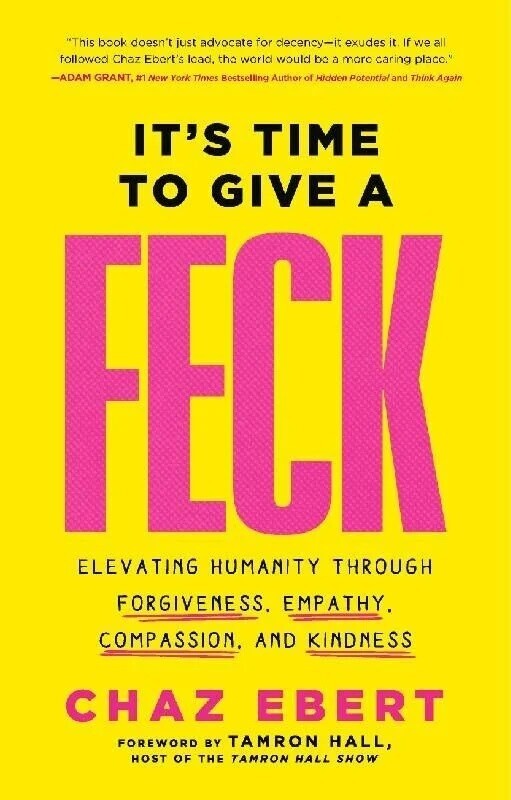
"Throughout my book tour, readers have said that having the prompts and workbooks inside the book have caused them to take immediate action," Ebert says. "They have realized who they needed to forgive or what specific act of kindness or compassion they could do that day."
During their time together, Roger and Chaz, who were married in 1992, had started charitable foundations, including the Roger & Chaz Ebert Foundation.
"Roger and I had 24 years together and I loved our work," says Ebert. "But before he passed away, we discussed how I would move forward and he believed that anything that wasn't fun or speaking to me anymore, I should let go. He knew I was my own person and had my own ideas, goals and causes that were important to me. Roger didn't want me to continue his legacy but to remember him while forging my own independent path without him."
For Ebert, that means focusing on organizations that help young adults, emerging filmmakers and technologists.
"To this day, I can still cry thinking of myself as that scared, embarrassed teen, pregnant and feeling I let everyone down," says Ebert. "Remembering all of the kindness and compassion shown to me by family and friends, I feel it is my mission to support programs to help young people who feel unworthy or inferior. We are all important and deserve love."
Credit and thanks to Next Avenue for permission to reprint.


